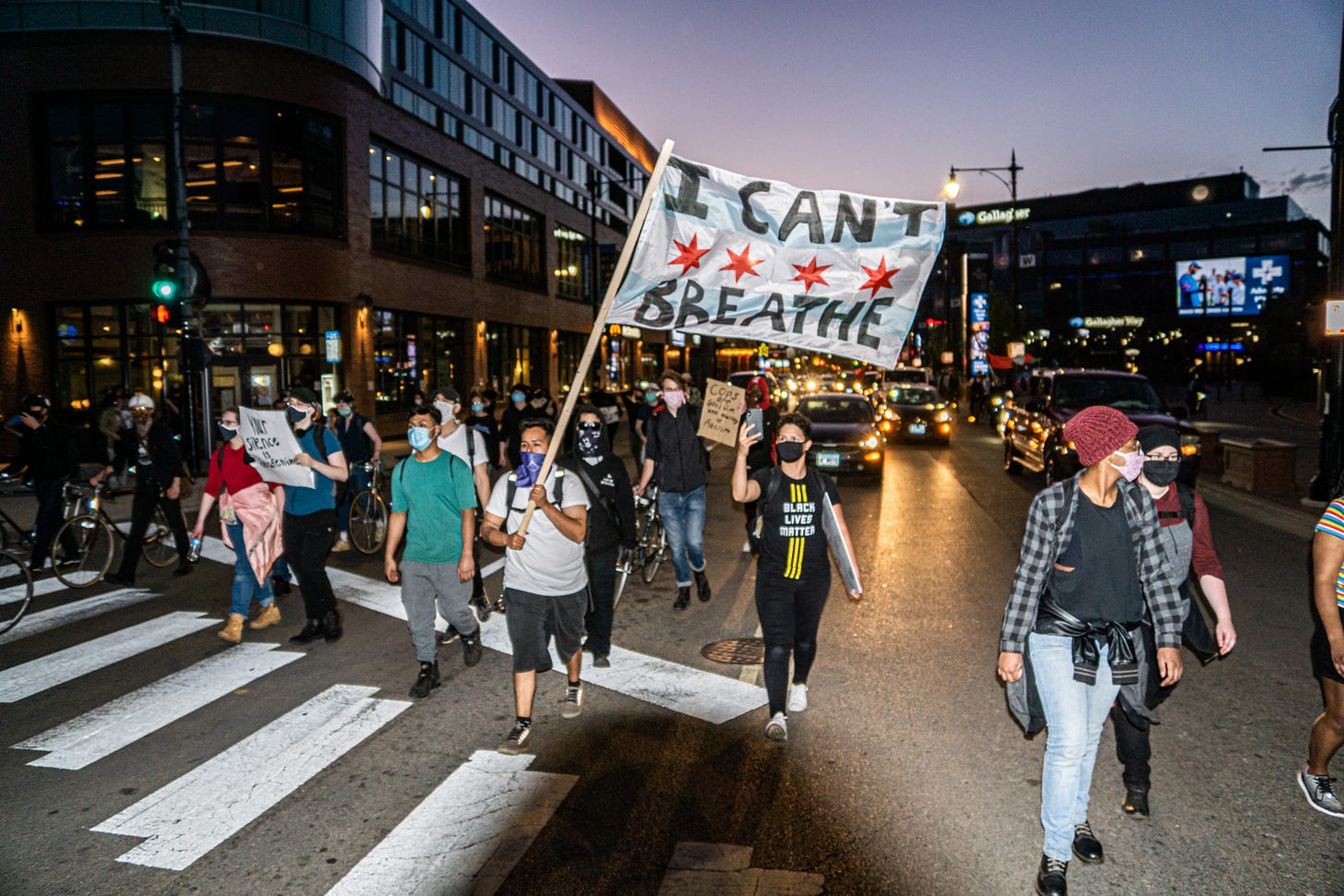Yes, the Left Lost
On crime, immigration, and inflation, progressives need to take the L
Earlier this week, Waleed Shahid, a strategist who has worked for Bernie Sanders, Alexandria Ocasio-Cortez, Jamaal Bowman, and the progressive group Justice Democrats, crystalized what seems to be an emerging left consensus with the following post:
Shahid’s claim seems to be: In 2024, the Democrats distanced themselves from progressive positions on immigration and policing and downplayed identity politics; therefore, their defeat should be interpreted as a referendum on the politics of the party’s centrist establishment, as embodied in Kamala Harris, and not its left flank.
Various versions of this case—that the problem wasn’t progressive excess, but centrist fecklessness—have been made since election night. Here is Gabriel Winant in Dissent: “The Democrats … comprehensively failed to set the terms of ideological debate in any respect. Their defensiveness and hypocrisy served only to give encouragement to Trump while demobilizing their own voters.” And here are the editors of The Drift: “The Democrats have nothing to offer as an alternative but a simulacrum of MAGA politics stripped of the libidinal pleasures of rage and transgression, like the caffeine-free version of Trump’s favorite beverage, Diet Coke.”
In other words, say what you will about the progressive politics that peaked around the 2020 presidential cycle—back when candidates were tripping over each other to affirm their support for decriminalizing border crossings and, yes, offering taxpayer-funded sex changes to illegal immigrants in jail—at least it was an ethos, one that could inspire and mobilize the party’s base. Winant goes so far as to claim that the surging activist left was the key to Biden’s victory in 2020: “Has anyone who complained that the 2020 George Floyd rebellion would cost Democrats votes due to the extremism of its associated demands reckoned with the empirical finding that the opposite proved true? That the narrow victory of Biden in 2020 was likely attributable to noisy protests that liberals wished would be quieter and calmer?”
Let’s concede a few points to this analysis. Harris did largely eschew activist language and positioning of the sort she had embraced in 2019-2020. Her stonewalling of her coalition’s most mobilized activist contingent of the moment, the pro-Palestinian cause, no doubt cost her some votes, especially among Arab-American voters in Michigan. There also isn’t nothing to the idea that the Harris-Walz campaign attempted to create a sort of MAGA Lite—with the camo hats, Harris’s touting of her prosecutorial credentials, Tim Walz’s hunting stunt, both of their boasts about being gun owners, and the shameless purloining of certain policies (like tax-free tips) from the Trump campaign.
Yet the claim that voters were repudiating 2024 Harris’s vague milquetoast centrism with pseudo-middle-American aesthetics, rather than the full-bore progressivism she spurned this time around, depends on the assumption that they decided their vote based on campaign events and ads. The reality is the Harris-Walz campaign barely lasted three months, whereas the Biden-Harris administration lasted four years. During that time, the progressive wing of the Democratic coalition exerted at least some influence on the White House. Moreover, many progressive Democrats elevated by the ferment of 2020 also held office at the state and local level. It seems fair to assume many voters regarded their experiences in recent years as a stronger basis for judging what to expect from Kamala Harris than her stump speeches. And to that extent, the 2024 result was indeed a referendum on progressivism.
The most decisive results come from blue cities and states, which saw a massive swing toward the GOP—propelled, as exit polls and other data suggest, by working-class voters, many of them black, Hispanic, and Asian, disgruntled with the Democrats’ record on crime, immigration, and affordability. Although the factors behind all these trends are complex, the shift can be read as a clear repudiation of progressive policy preferences.
From the mid 2010s to the early 2020s, progressives aggressively pursued an anti-policing agenda. Beginning in 2018, they succeeded in propelling progressive local officials into office, and in getting national politicians—including the previously tough-on-crime Kamala Harris—to endorse their positions. Then, 2020 and 2021 saw massive spikes in lawlessness, disorder, and violent and petty crime. By 2022, a backlash was underway. In San Francisco, the nation’s bluest city, progressive District Attorney Chesa Boudin was recalled that year. The backlash continues, most recently across the San Francisco Bay in Harris’s native Alameda County, where another left-wing DA, Pamela Price, was recalled by a huge margin, along with Oakland Mayor Sheng Thao. (Seneca Scott covered this campaign in Compact.) San Francisco and California more broadly also saw swings toward Trump.
On immigration, the implausibility of progressives’ attempted self-exoneration becomes even more evident. Yes, Kamala Harris cut ads and gave some promising to tighten border enforcement in recent months. But the Biden-Harris administration, in office, oversaw an unprecedented influx of migrants that responded at least in part to progressive activist demands to reverse Trump’s hard-line border policies. This influx had very direct effects on many people’s lives. In my part of New York City, a makeshift migrant shelter housing 4,000 people became a flashpoint of controversy after an observable spike in litter, panhandling, and noise, as well as a few incidents of violence; meanwhile, in the neighborhood where I used to live, the municipal recreation center—a community hub and main site for local kids’ afterschool activities—was closed to the public and turned into a temporary shelter.
These sorts of things were happening across the country. To what extent this happened because of the influence of progressive groups—as opposed to the Biden administration’s incompetence at dealing with the increasing sophistication of global human-trafficking networks—is beside the point. For years, progressives have contended in effect that not just Trump’s policies but any border enforcement at all is tantamount to fascism. When Angela Nagle wrote an article in 2018 titled “The Left Case Against Open Borders”—reiterating a middle-of-the-road position once shared by Bernie Sanders, Barbara Jordan, César Chávez, and many others—she was roundly condemned by left media. The fact that Harris retreated from the maximalist open-borders position is beside the point. It was, in effect, the rationale for several years of border policy under Biden, and voters rejected it.
The third—and probably most important—issue that pushed many voters right was inflation and affordability. Here we are dealing with global trends caused by pandemic policies and geopolitical developments; unlike with crime and immigration, there was no overt left-wing case for doing stuff that would cause things to get more expensive. Or was there? The origin of the inflation crisis was in the unprecedented and insane shutdown of much of the world as a strategy of virus containment. Lockdowns were implemented by a wide array of governments of the right, left, and center. That said, the left position on Covid was overwhelmingly on the most extreme end of the restrictionist side; progressives argued (and still do!) for longer and more aggressive lockdowns on the grounds that this meant valuing life over “the economy.” Hence, the disruptions of the Covid era, the ramifications of which are still playing out today, were in part the result of what the activist left openly wanted and promoted: an indefinite suspension of “normal.”
A further point. When inflation was surging in the first years of the Biden administration, progressive opinion largely ignored or dismissed it as a concern. Those who spend too much time on Twitter may recall that it was fashionable among very online leftists to refer mockingly to people complaining about the prices of “treats.” As Doug Henwood—a rare left inflation hawk—recalled in Jacobin last week, when he tried to get progressives to take the issue seriously in 2022, he “was denounced by some as the reincarnation of Paul Volcker … Inflation, it was explained to me, was a concern of the rich ... On social media, I saw bizarre dismissals of concerns about inflation, with one prominent liberal economist blaming the media for inventing it.”
There is room for debate about how much power the activist left actually exercised over the Biden administration or the Democratic Party more broadly in the past five years or so. But on the issues that determined the election, progressives staked out the positions on the basis of which voters rejected the party this year. By telling themselves the American people voted against the border-hawk cop Kamala Harris briefly tried to sell herself as this year, rather than against the policies they eagerly supported, progressives risk detaching themselves even further from political reality.
This week at Compact
Compact has continued to offer some of the most original and varied post-election coverage out there. Don’t miss any of these:
Matt Gasda on (American) “Culture in the Age of Trump”: “I suspect—and hope—2024 is a moment like 1830: a time of transformative technology, elite failure, populist revolution, intellectuals turning toward the romance of the frontier.”
Justin Vassallo on what ails the Democrats, and what might remedy the party’s deep pathologies: “To become truly competitive again, Democrats must rework their agenda and recognize that economic populism, alongside more pragmatic stances on certain social and cultural issues, is the baseline of a working-class politics that transcends race, gender, and region.”
Sohrab Ahmari on the war over “normal” (and “weird”) and who gets to define these—and how, despite their frequent anti-normative posturing, Trump and the Republicans won this round of it.
This week, we also published Nathan Pinkoski on Tony Blair, usually thought of as the consummate embodiment of neoliberal globalism. But looking at Blair’s new Machiavellian treatise On Leadership, Pinkoski finds in his political thought a surprising affinity with Curtis Yarvin-style neoreaction (!).
Meanwhile, in her latest dispatch from Canada, columnist Leila Mechoui finds a rightward political shift among young people even more dramatic than the one on display in the recent US election. Indeed, as she writes, “Canada may well be the first OECD country to create a youth population more right-wing than its older generations.”
And in the realm of literature, Valerie Stivers weighs in on a new publishing trend, the menopause sex novel. In new novels by Miranda July and Susan Minot, Stivers finds “an intense kind of sexuality that feels relevant in the modern era, and is expressive of modern dysfunction.”
Finally, Reinaldo Laddaga argues that it isn’t just undergraduates who don’t want to read literature anymore—it’s also the literature professors. “Having jettisoned literature,” he writes, “we professors lost whatever claim we had to expertise—and, in the process, our reason for existing.”



